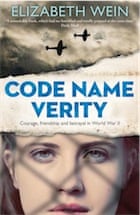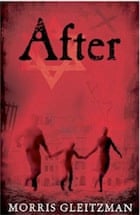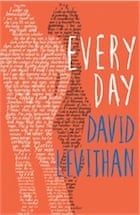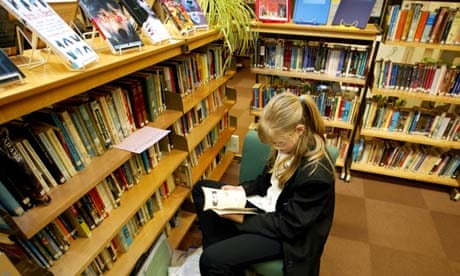If there is anywhere that young adult literature should be read, it's schools. But more and more it seems that curriculums have to be followed, and books that could be relevant to teenagers (and, in a lot of cases, books altogether) are getting left behind.
In primary school we are encouraged to read as much as possible and as widely as possible, but once we get to secondary school and the exam workload kicks in, reading takes a back seat. And secondary school is the time when we should really be making kids read, because there are so many great books out there for teenagers and young adults with brilliant stories and profound messages behind them. So many of them can be applied to things that happen on a day to day basis in secondary schools but, in my experience, these opportunites have been missed at every turn.

Reading books that are relevant to lessons, for example, is one missed opportunity. Why aren't books like Code Name Verity by Elizabeth Wein and Once by Morris Gleitzman being taught alongside history lessons on the Second World War? Why isn't David Levithan's Every Day being used as a prime example of the issues surrounding gender and sexual identity in PSHE lessons for sixteen year olds? These stories could be so beneficial to students, while at the same time potentially opening them up to a broader reading base and helping them discover something in themselves that they didn't know about before.

Perhaps one explanation is the current pressure on school library budgets. If you are in secondary school right now, go to your school library and have a look at the fiction section and have a rough guess at how many of the books on the shelves were published in the last five years. Looking at my own school library I'd say it was maybe fifty books. And that is a problem. It's all very well pushing the classics but that isn't necessarily what children want to be reading. If schools can provide more modern books and have a varied range to appeal to all readers then they're going to have a larger readership and more reason to keep buying new books to accommodate for their readership.
This is not to say there aren't positives. Schemes like Reading Matters mean that children in secondary school who need support with their reading are given it by other students further up in the school. This not only gives young students more support, but schemes like this can also help to give children the motivation to read - especially if they're reading books they enjoy. Older children can recommend books they liked at a similar age, and nothing can replace genuine enthusiasm. I think that Reading Matters and similar schemes should be offered to all schools across the country as a way to make reading more relevant in the digital age.

All in all, I think young adult literature has great potential and I wish schools could recognise this, instead of writing it off in favour of more established authors. YA fiction is specifically aimed at teens and contains really strong messages targeted to them, covering topics and issues that teenagers deal with on a daily basis. Schools need to do more to get these books to kids, and not only get them reading but also thinking critically about the problems these books discuss.
Do you think YA fiction should be taught more in schools? Does it compare to 'the classics'? Or should reading for education and reading for pleasure just be kept separate? Send us your thoughts - childrens.books@theguardian.com - or join the discussion on Facebook
Your responses
Dawnya
Using YA lit allows us to touch on current problems of society. It is real life. It is what the students are hit with every day of their lives. Their brains aren't developed enough to understand that Hester Prynne in The Scarlet Letter is the same as the quiet, little girl who sits in the back of the math class, ostracized because she is fourteen and pregnant. They will, however, relate to a modern-day story with language they hear every day. Almost everyone will be able to recognize the power of that message.
Don't get me wrong; I love the classics. I loved the classics when I was in high school. I was one of the few. Most students don't have that love. It is up to us to provide interesting and relevant literature to students who would rather text, snapchat, instagram, and play video games with their friends around the world. Better to provide interesting, thought-provoking literature that will keep them awake, rather than outdated ideas and verbiage with which they will struggle and lose interest.
I am very fortunate to work at a school where we read 12 to 18 YA novels to our 8th graders every year. And that is just what we read OUTSIDE of the English/Language Arts class! In class, we read some classic short stories, and we also cover poetry and informational text. All of our students find something they have enjoyed reading throughout the year. Many of our parents have reveled in the fact that their child is now reading for enjoyment because of something he/she was presented with at our school.
Alma
As a YA author, my resounding response is ABSOLUTELY! I grew up with books and fell in love with reading at an early age and frankly nothing could have STOPPED me by the time I reached the school library (much of the contents of which I was already familiar with before I walked in through its doors for the first time...) But I utterly believe in the love-of-reading idea and in what it engenders in children. I utterly believe that books are a greater and more enchanting escape than any video game EVER because books let you use your own imagination instead of someone else's and that's beyond price. I utterly believe that YA books tackling difficult issues are pretty much essential for young people with similar problems in real life - because it teaches the all-important lesson that nobody is alone and that no problem needs to be faced in isolation.
In short, I believe in books. I believe in children learning to read early and often. And I believe that making YA literature accessible to its target audience in the places where they most often are at their age - in the schools - is something that is a worthy crusade to follow.
Lesley
As a school librarian, I agree wholeheartedly with the sentiments expressed. I regularly provide teachers at my school with lists of fiction to support the curriculum, particularly subjects such as history, but of course there is limited time in the curriculum for classroom based exploration of these books, not to mention the cost of providing copies for each student.
A quick check of my library management system shows that about a quarter of my fiction books were published within the last five years – more than 350 books. I organise author visits 2 or 3 times a year, where the authors' books are sold, and we hold book sales regularly. But I am a full time librarian with a supportive senior management team and a good budget. In many schools around the country you will find dedicated staff making little budgets go a long way and doing lots of exciting things in and out of their libraries, but you will also find schools with no library at all, a library run by an already stretched teacher with little time or resources to give it, or a roomful of books that no-one looks after at all. Until school libraries and the staff to manage them effectively are made statutory, this inequity of provision is likely to continue.
Christopher
Your article points to three separate issues: the need to read more widely around curriculum topics, the need for young people to have access to a range of current YA fiction, and the desirability of formally "teaching" YA fiction.
I cannot imagine a school library with as few as fifty fiction books published in the last five years – many have a policy of removing from stock most of those published more than ten years ago – but of course a glance at the shelves of a poorly maintained library won't reveal many of them because the latest and best are out on loan. However, not all schools employ professional librarians and not all local authorities still run a schools library service. Parents and teachers need to agitate for professional support in every school.
Laura
A good school benefits from the knowledge, enthusiasm and pro-active approach of a qualified professional librarian who collaborates with teaching colleagues to introduce both them, and the students they teach, to high quality, challenging and stimulating teenage fiction. Good schools have librarians who run reading challenges, lead book groups, set up shadowing groups, produce book lists, mount displays, set up blogs, organise Book weeks and author events, along with a whole panoply of book related activities to introduce students to the best of Young Adult fiction.
Budgets have undoubtedly been constrained in the last year - but school librarians can sign up for schemes such as those offered by the Booktrust Bookbuzz and the School Library Pack, as well as the annual World Book Day celebration to ensure young people get access to a wide range of exciting newly published fiction.
Of course we could do more with the support of Ofsted and the government if they could respond to the recent campaigns and petitions to make school libraries statutory. In the meantime we are out there promoting reading and introducing teenagers to the wealth of fantastic writing available.
